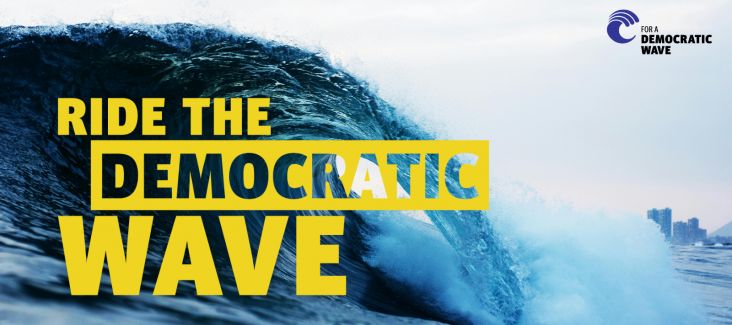War is back on the European continent, and there is a clear and undisputed risk of democratic backsliding throughout Europe. I shudder to think that if Donald Trump returns to the White House this November, Europe will lose a stable partner in its closest and most trusted ally. At a time when democratic principles are under siege both at home and abroad, the need to fortify democracy in the European Union has never been more necessary.
This is the backdrop of the Democratic Wave campaign, launched ahead of the 2024 European elections and led by Democracy International and our friends at Federation for Innovation in Democracy – Europe (FIDE).
Democratic Wave is not merely a call to action; it's a rallying cry for the revitalisation of European democracy. It’s primarily aimed at 2024 European election candidates, calling on them to prioritise democracy in the new parliamentary term. It’s not that the 2019-2024 Parliamentary term didn’t see any democracy developments - just the opposite, in fact. The last five years have been democratically groundbreaking.
First, take the unprecedented Conference on the Future of Europe, which laid the groundwork for a citizens-centred reform of the EU. Next to European elections that bring 400 million people to the voting booth, the Conference has arguably been Europe’s next greatest democratic endeavour. It has been Europe’s first great experiment with deliberative democracy, involving 800 randomly selected citizens from all walks of life, civil society, social partners, members of all EU institutions, and even members of national parliaments to develop proposals for Europe’s future. It has led to the European Parliament, not once, but twice, historically triggering Article 48 of the Lisbon Treaty to call for Treaty change and a new European Convention.
I recall some years ago when the words “Treaty change” were taboo and a no-go. Now they are mainstream and normalised, thanks in large part to the Conference. Even top EU leaders understand that fundamental democratic reforms must take place if the EU is to meet the needs and challenges of today, let alone be fit for an inevitable enlargement.
Secondly, as a direct result of the Conference, five additional European Citizens' Panels have continued the new democratic tradition of deliberative bodies of citizens discussing European policy areas and putting forward proposals to the European Commission. The Panels have proven that citizens can discuss both technical and normatively difficult subjects.
Thirdly, we have the European Citizens’ Initiative, the world’s first and only instrument of transnational participatory democracy that has skyrocketed in terms of use and success in the past five years. We’ve witnessed a record number of successful initiatives, thanks largely to its growing support infrastructure, showing a strong appetite for citizens’ engagement.
But, the political impact of these democratic instruments and innovations is still lagging. The EU has yet to adequately address the fundamental demands of the Conference on the Future of Europe, and successful European Citizens’ Initiatives have not been effectively translated into law.
This is where the strengthening of democratic instruments and mechanisms comes into play. By advocating for the reinforcement of these tools, the Democratic Wave campaign seeks to amplify the political impact of citizens on EU policy - not just at election time, but also in between election cycles.
And let's face it: democratic renewal doesn't come cheap. Proper citizen participation requires resources, both in capacity and know-how, as well as financially. Democratic reforms can only be achieved through well-resourced citizen engagement processes. That’s why we’re also calling on the European Parliament to advocate for enough funding so qualitative citizen engagement can be delivered.
Finally, central to the entire Democratic Wave campaign is the establishment of a European parliamentary intergroup on democracy.
There are currently 27 intergroups in the European Parliament, ranging from Anti-Corruption to Cultural Heritage, and even to Food and Wine. While I don't argue that our fabulous European wine and cuisine shouldn't be discussed, there is not one single intergroup on the topic of democracy or citizens' participation, nor remotely close to the topic. In fact, there has never been an intergroup on democracy in the history of European Parliament intergroups. How is that possible in Europe’s only directly elected body and the voice of citizens?
Democratic Wave sees a major flaw with this. If intergroups are meant to serve as coalitions of the willing, there has never been a more compelling reason to establish an intergroup on democracy in the 2024-2029 term. In a Parliament expected to be significantly more far-right and anti-democratic in its next term, we need to know exactly who our democratic allies are. We need to know who the champions for democracy are. We need to easily identify them, and they need to easily identify each other. And we need them to join forces. True, intergroups are not official bodies of the European Parliament, however, they act as a forum for exchange and for action and serve as a place for contact between intergroup members and civil society. The discussions and work that would take place in a democracy intergroup could serve as a catalyst for democracy reform in the Constitutional Affairs Committee or on the voting floor in the European Parliament plenary.
In essence, the Democratic Wave campaign calls upon candidate Members of the European Parliament to pledge their commitment to European democracy. The stakes are high, and the challenges are formidable, but the European Parliament can play a pivotal role in shaping a more responsive, inclusive, and citizen-centered European democracy.
Are you a candidate for the European Elections? Sign the Democratic Wave pledge here or simply reply to this email: https://democraticwave.eu/
NGOs, sign the Democratic Wave open letter here: https://democraticwave.eu/open-letter/
Citizens, write to your candidates here: https://democraticwave.eu/write-candidates/
